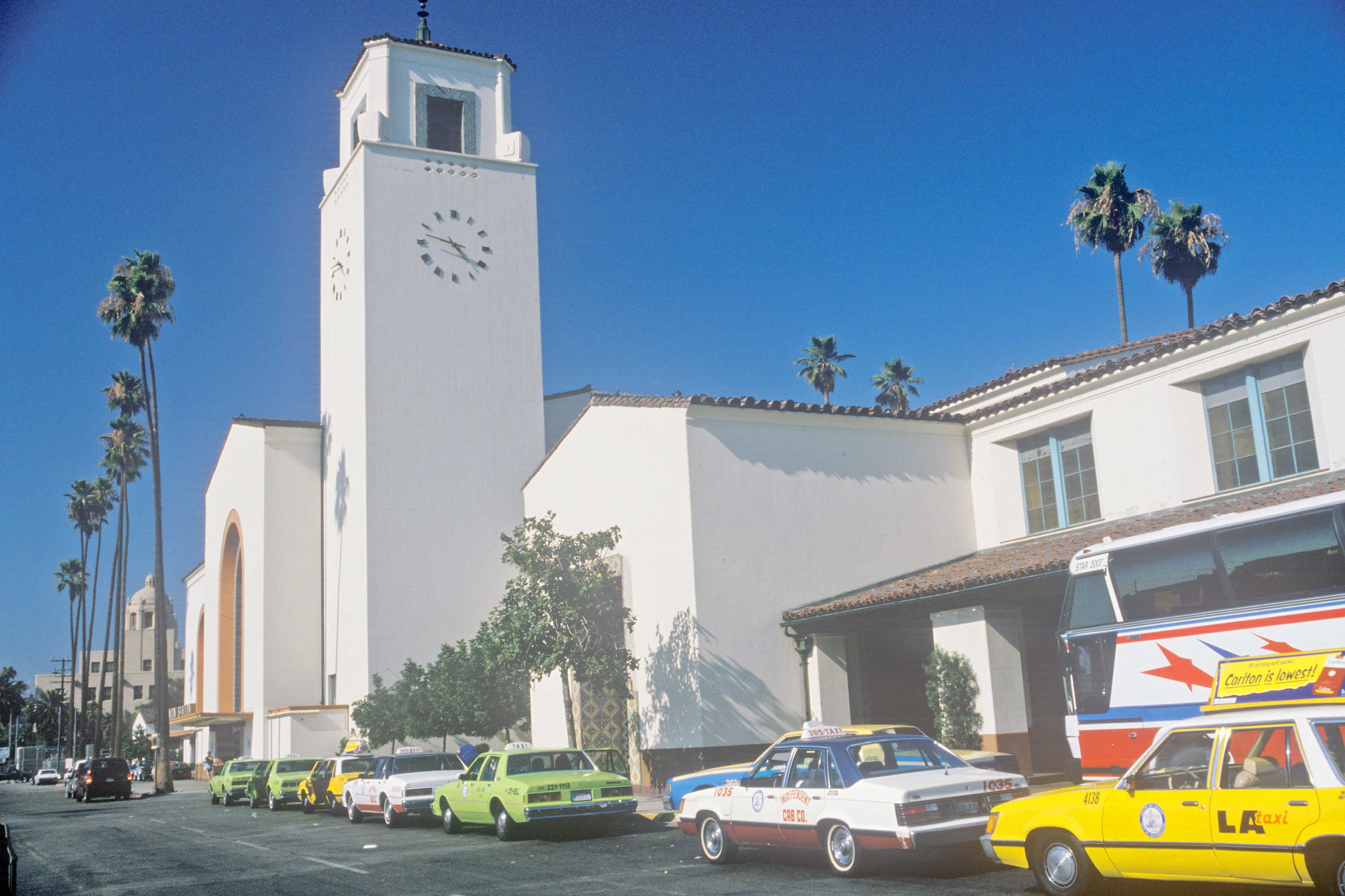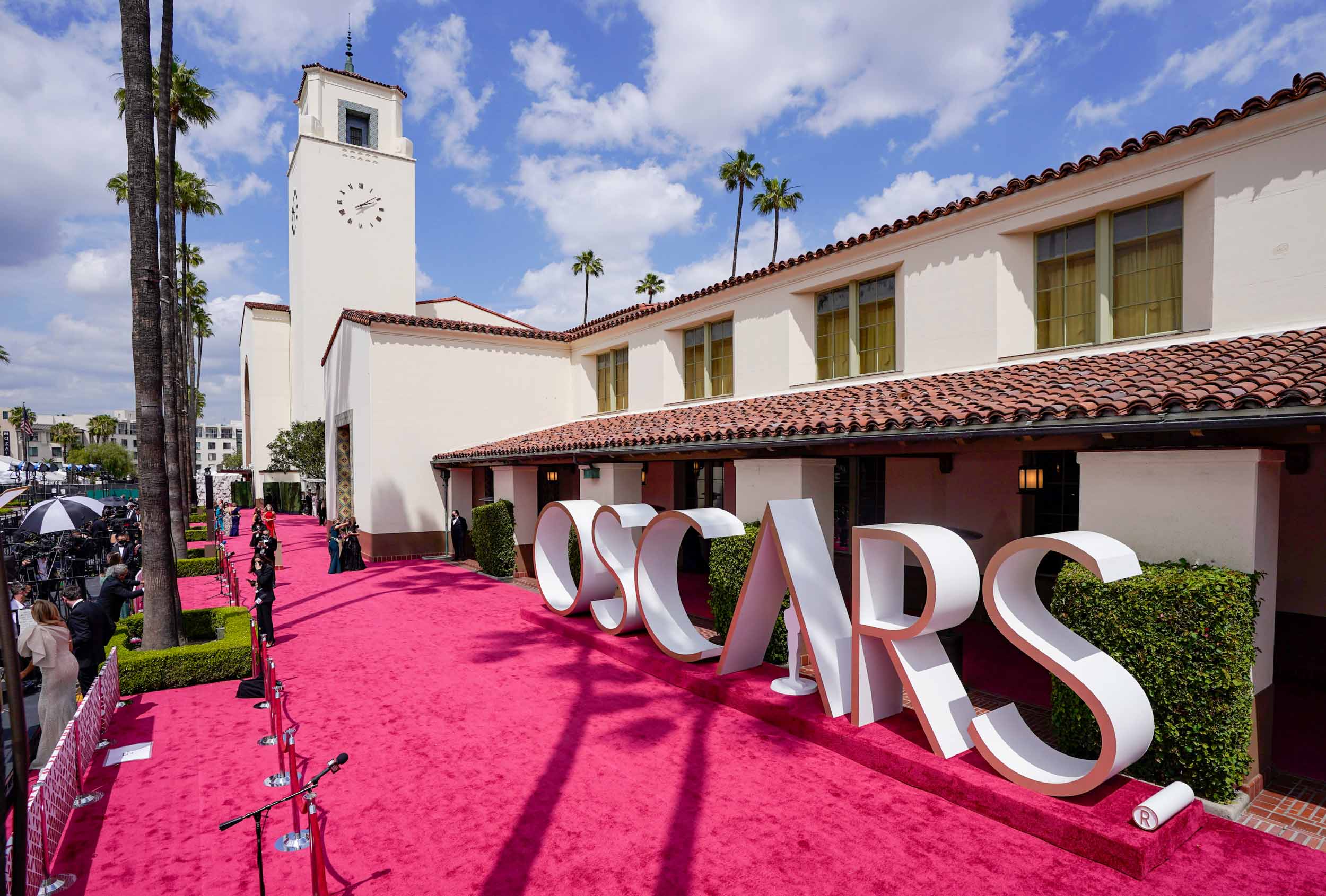A train station might seem like an unlikely Academy Awards venue, but in the case of the Oscars ceremony held at Union Station on April 25, 2021, the unusual setting was a shrewd solution to a complex problem. For over a year, event planners across the globe had faced the immense challenges of staging live shows during a deadly pandemic.
While many award ceremonies canceled their COVID-era dates or mounted virtual programs, the Academy of Motion Picture Arts and Sciences decided to stage the 93rd Oscars show as a live event. After briefly considering the Biltmore and Roosevelt Hotels, the Academy selected Union Station to accommodate the 170 nominees and their guests, plus almost two dozen presenters and several hundred production staffers for Oscars night in 2021.


Images: (left) Union Station Rail Transit. Getty Images, photo: Joe Sohm/Visions of America; (right) A view of the red carpet during the 93rd Annual Academy Awards at Union Station on April 25, 2021. Getty Images, photo: Chris Pizzello-Pool
By the end of 2020, Hollywood had started mounting large productions again under COVID-safe protocols, giving Academy Awards producers confidence to apply the same techniques to the ceremony.
Union Station, a centrally located downtown landmark, was often temporarily madeover as a rental and filming site for dozens of movies. The station's hybrid blend of Art Deco, Spanish Colonial, and Mission Revival architecture has made it attractive to event planners and location scouts looking for a quintessentially Southern Californian atmosphere. The station was already a marvel when it opened in 1939 to consolidate terminals servicing the Southern Pacific, Union Pacific and Atchison, Topeka, and Santa Fe railroads. For countless visitors, the first glimpse of Los Angeles was the station's broad ticket hall, featuring a polished, 110-foot wooden counter and an airy waiting room replete with brass chandeliers, marble floors, and 40-foot windows.
The 2021 ceremony’s production designer, architect and Tony Award-winning set designer David Rockwell, cited those throwback elements as a plus, saying he wanted his set to work with “Union Station's soaring and historical details” rather than against them. Creatively working with the constraints of the space, Rockwell created a set that functioned as a borderless “room within a room.” The designers baked all lighting and camera positions into the temporary construction at ground level, and the open-plan foregrounded the station itself rather than trying to hide it.






The centerpiece was a mini “amphitheater” comprised of tiered dinner tables that referenced the Awards’ early incarnations as an intimate industry dinner. Similarly, the musical numbers recorded on the Dolby Family Terrace at the Academy Museum of Motion Pictures, as well as the satellite events held for nominees and presenters in London, Paris, and other cities, recalled the ceremonies of the 1940s where a sister event was held on Broadway to allow actors working weekday shows to participate.
If Oscar night is Hollywood’s most exclusive ticket, Union Station may be Los Angeles’s most democratic, a space where people from all walks of life mix, mingle, and go about their business, even those without a fare or a fixed destination in mind. On holiday travel peaks, Union Station greets close to 75,000 commuters and travelers, and although traffic was a fraction of that on April 25, 2021, the station's mandate remained the same. Some commuters experienced access issues in the run-up to the ceremony, but much of the station was open to the city on Oscar night in marked contrast to the Hollywood & Highland subway station underneath the Dolby Theater, which is shuttered for the Oscars.
As LA Metro deadpanned before the event, the station would “remain open to transit riders throughout the awards events and riders will be able to access all bus, rail, Metrolink, Amtrak, and private transportation providers, along with vendors.” The sturdy bureaucratese offers a lesson that perhaps only Union Station and its one-time, emergency stint as an Oscars venue could offer: Hollywood may be in the business of making magic, but for many of those involved, it’s all in a day’s work.